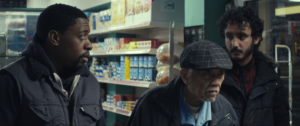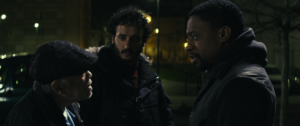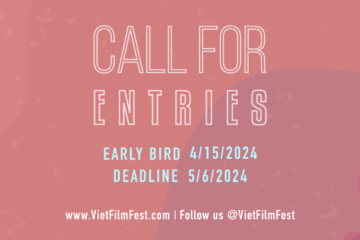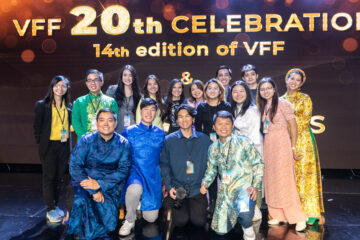What happens when chance encounters among strangers form everlasting relationships? How do these strangers-turned-friends impact our lives and in turn, how, if at all, have we impacted theirs? This is the premise of Malabar, directed by Maximilian Badier-Rosenthal. Viet Film Fest’s Humanities Out There (H.O.T) Public Fellow June Ke spoke with Maximilian about his inspiration and reflections behind this 2021 Award-nominated Best Short. This interview has been edited and condensed.
What inspired you to tell this story?
The actor of my previous short film Ông Ngoai, Marcel Jacq, portrayed my Vietnamese Grandfather. He was 82 when we shot this film. I accidentally met him while I was going to my 9 to 5 job. He never acted in a movie before, nor in a short film, but he was an excellent actor. On the set of Ông Ngoai, Mourad, and Harrison, the actors playing the young protagonists in Malabar, helped me take care of Marcel. They both showed so much respect for Marcel, and they had funny stories to tell me every day about him. I’ve always been grateful and always wanted to thank them for bringing such unforgettable memories about Marcel. So I decided to write a film for Marcel, Mourad, and Harrison. I then came up with the screenplay of Malabar. Unfortunately, Marcel passed away a few months before starting to shoot. I had to overcome the sadness of losing Marcel. I then met Hiep Tran Nghia, a great Vietnamese actor based in France. He brought so much energy in portraying Marcel. Making Malabar was the best tribute that could honor our memories of Marcel Jacq.
2. How does your bicultural (French and Vietnamese) background influence the way you portray intercultural conflicts and misunderstandings in this film?
My bicultural background, from my Mother being Vietnamese and my Father being French, has probably influenced the way I portrayed intercultural conflicts and misunderstandings in my films but in an unconscious way. I was writing for Marcel (played by Hiep), Harrison, and Mourad. I mostly tried to stay as close as possible to them, it was the easiest way for me to find how the character would react “if they really were Marcel, Harrison, or Mourad”. I also relate to my roots. That way I could focus my writing on details, and not necessarily on finding each character’s arc. I try to emphasize little things that we don’t necessarily see in everyday life unless we pay close attention. In that sense, conflicts and misunderstandings are quickly undramatized. For example, Marcel’s candies came from my Vietnamese Grandfather, he always had some in his pocket. He used to give his 3-year-old grand granddaughter candy when she was shy saying Hi to him. And it worked! After getting the candy she said “Hi.”
 In the film, all of the three protagonists are ethnic minorities in France from different racial backgrounds. Was that an intentional choice, and why?
In the film, all of the three protagonists are ethnic minorities in France from different racial backgrounds. Was that an intentional choice, and why?
Even if it might look like I intentionally chose three protagonists from different racial backgrounds, it wasn’t. As I mentioned in the first question, I wrote Malabar because Mourad and Harrison helped me take care of Marcel Jacq during the set of my previous short film Ông Ngoai, not because of their racial backgrounds. Moreover, until now, I imagine my protagonist according to the people I grew up with, family or friends, people that I’ve been working with, people that I know well. For example, Mourad’s friend Clément who helped them translate was written for my Uncle, David Rosenthal, and played by him. He wasn’t even an actor. The same goes for the man working at the grocery, Abichan, he’s my childhood friend. The emotion on the set of Ông Ngoai was so unique that I wanted to immortalize it on screen. Just that pure emotion, nothing more, nothing less.
When the incident occurs in the film, the two young protagonists are skeptical to bring in the police, so they settle matters privately. Do you consider this private resolution an alternative to policing (which has come under global criticism for racial profiling and the use of excessive force)?
Well, I am aware of the global criticism around police due to racial profiling and the use of excessive force. It is important to see it on screen, and that filmmakers rise up about it. But I felt that it wasn’t the purpose of my film. Every time I see a movie dealing with the suburbs of Paris, I see the police somewhere. Integrating the police wouldn’t have led my film to the right emotion. Talking about the police was just a way to keep the protagonists tied together for a moment. In the middle of the film, I intently end the excuse of the police. I wanted to let my protagonists breathe and show who they really are.
What do you hope for the audience to take away from the film?
My film’s perspective might be different from the perspective of the viewers. The style of both of my short films is closer to what Paul Schrader would call Transcendental Style. I mean, it is a very difficult style to execute, and sometimes it could be seen as pretentious. My goal is to not appear pretentious. I have always seen this style in specific films or executed by some famous director like Ozu or Bresson for example. I always wondered how it could be with the people surrounding me. People that I consider “normal” not only because I grew up with them, but because they are part of my reality of the society I grew up in. It is even easier with people I know because I know what I’ve felt in the locations I described in the screenplay. In some specific scenes in Malabar, like the last one, we just see the protagonists acting like they are in real life. Transcendental style, to me, is seeing a protagonist acting in a space and time that is closer to reality, mostly when nothing happens, giving us the feeling that time stops. My goal throughout Malabar isn’t to provoke an emotion, but for the viewers to create their own emotion watching the film.
Watch Malabar in three setlists Into the Light and Out from the Dark (Free Community Day Screenings), and Public Intimacies, Private Tribulations during Viet Film Fest from October 15-30, 2021. Suggested $10 donation to support our staff and operations. Tickets for purchase at https://vietfilmfest2021.eventive.org/welcome.
###
ABOUT MALABAR
At night as they return home to the suburbs, Mourad and Harrison accidentally bump into Marcel, an old man of Vietnamese origin. Watch the Malabar trailer here
ABOUT MAXIMILIAN BADIER-ROSENTHAL
Maximilian Badier-Rosenthal grew up in mixed culture, with a French father and a Vietnamese mother. After a degree in Chinese obtained in Beijing, he wrote and directed his first short film at a workshop in Aubervilliers, France. While taking part in the Génération Court Film Festival, he met Yassine Qnia, who produced in 2016 (with Nouvelle Toile) his first short film: Ông Ngoai. The story is inspired by an event that happened to Maximilian with his grandfather when he brought him an unwanted leather armchair. In 2020, he directed his second short film, Malabar, produced by Don Quichotte Films. It’s the story of an accidental meeting at night, between two young men and a retired Vietnamese man.
ABOUT WUJUN (JUNE) KE
Wujun (June) Ke is a Ph.D. candidate in Comparative Literature at UC Irvine. She researches Daoism, temporality, and contemporary Chinese cinema. As a Humanities Out There (H.O.T) Public Fellow, she assisted Artistic Director, Eric Nong, in organizing Viet Film Fest to promote the arts in a capacity that engages directly with the community.
ABOUT VIET FILM FEST
Viet Film Fest was created in 2003 by the Vietnamese American Arts & Letters Association (VAALA), becoming its largest program. As the largest international Vietnamese film festival of its kind in the world, Viet Film Fest showcases the best creative work by and about Vietnamese people. Through the universal language of film, Viet Film Fest brings together multiple perspectives to expand the scope and horizons of Vietnamese cinema. Our award-winning films have been screened in numerous cities and countries. For over a decade, the festival has attracted thousands of national and international attention for its stunning showcase of shorts and features submitted from all over the world. As the hub of the Vietnamese movie industry, the festival hosts networking opportunities with prominent directors, media experts, and producers, including Tran Anh Hung (The Scent of Green Papaya), Tony Bui (Three Seasons), Ham Tran (Journey from the Fall), Victor Vu (Yellow Flowers on the Green Grass), Le Van Kiet (Furie), and Charlie Nguyen (The Rebel).
VIET FILM FEST 2021
October 15-30, 2021
Program Schedule and Tickets: https://vietfilmfest2021.eventive.org/welcome
Tickets are subject to availability and geolocation restrictions (“geofencing”). In-person events subject to Covid-19 protocols.
Follow @vietfilmfest on Facebook, Instagram, Twitter, and YouTube




0 Comments